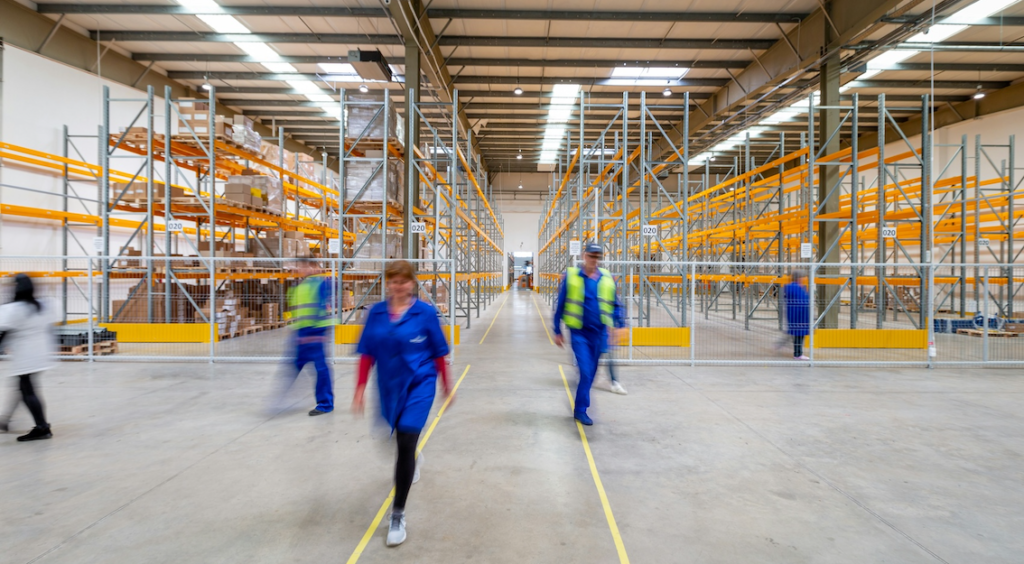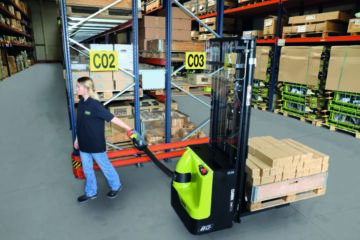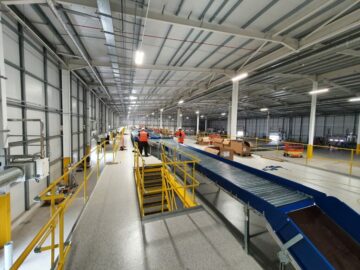

- Almost nine in 10 warehouses pop on the tunes for their workers, as a survey of employees by music licensing company PPL PRS found that of those that don’t, the majority (89%) wish they did.
- Warehouse workers say music makes them feel happy (54%), energised (49%) and relaxed (43%) but over half (51%) say music could be a challenge, needing to be able to hear their co-workers.
- Over half (55%) of warehouses are playing pop – but a tenth of the workforce would rather listen to rock.
- Leadership coach Debbie Green explains the power of gamifying music and her experience working in warehouses.
A new survey from music licensing company PPL PRS of 500 UK workers reveals that almost nine in 10 (87%) warehouses play music, while one in seven (13%) work in silence. Of these employees, nine in 10 (89%) expressed a desire for music, as just one in 10 (11%) prefer silence.
How does music benefit warehouse workers?
The average work week for a warehouse worker is 35 to 40 hours. PPL PRS has looked into the effects of working long hours on your feet in its walking 9 to 5 guide, after a 2023 survey of 500 standing workers revealed physical tiredness, sore legs, mental fatigue and low mood to be the most commonly-experienced mental and physical effects of doing so. However, it also found that over four in five (82%) believe that music improves their mood during the working day.
In PPL PRS’s latest 2024 survey, it found that over half (54%) of warehouse workers feel happy when listening to music at work, almost half (49%) said it energised them, and relaxation comes with tunes for over two fifths (43%), while just 6% said it made them feel distracted, and less than 2% reported feeling anxious, tense or upset.
Music can lead to increased productivity in warehouses, too; almost three in 10 (28%) said their concentration improves. Respondents ranked packing and unpacking boxes (71%) as the most positively affected task, followed by moving boxes (59%), loading vehicles (44%) and building and assembling stock (38%).
So, how can employers harness this potential productivity booster?
Leadership coach for PPL PRS, Deborah Green, shares:
“I’ve worked in warehouse environments that have had music playing and it creates an opportunity to have some really fantastic conversations. When a tune comes on and people start reminiscing or chatting about what the tune means to them, you get to know people a lot more. It enables you to adopt a curious mind to find out more about that individual, which in turn builds better relationships because, as leaders, you’ve got to know your teams on a human level.
“By leveraging the power of music with thought and consideration, leaders in a warehouse environment can enhance productivity and employee morale and create a great place to work.”
Employers can use music to support the bottom line and boost morale. According to our survey, over half (52%) of employees believe that music boosts the mood of the workplace, while more than four in 10 (43%) found that it reduced their stress levels when working.
Other benefits of using music in a warehouse setting are that it can be used to drown out loud noises, which creates a better working environment for one in six (15%). One in five (22%) even said they found music builds bonds within their team when discussing music tastes.
How to play music in a warehouse?
If you are convinced that playing music in the warehouse will lead to a better working environment, the next consideration is genre; currently, pop powers productivity, which is played in over half (55%) of warehouses. RnB followed (8%), along with hip hop (7%) and chill-out music (7%). Heavy metal and Jazz are least popular, each played in less than one in 100 (0.7%) warehouses.
What is currently played doesn’t necessarily reflect the desires of the workforce; just three in 10 (30%) agreed that pop rules the genres, followed by RnB (13%), while a tenth (10%) of workers said they like to ‘rock’ out in the warehouse, listening to rock. However, just one in 50 (2%) would opt for heavy metal or reggae.
When it comes to how to play music within a warehouse, Deborah Green also suggests:
“To keep the music fresh, regularly update playlists or allow different teams to curate music for specific shifts, creating an inclusive environment. That way, everyone gets a chance to hear their favourite tunes and add some new ones to their own playlists.
“You can also gamify the music selection. As leaders, you can create a ‘song for the day’ or ‘guess the song before the lyrics kick in’ or ‘guess whose song choice it is’. All of these small gestures, using music as the foundation, can promote a great environment to work in.”
But before you press play, remember you will usually need to have a music licence to play music within a warehouse or factory.
Why wouldn’t you want to play music in a warehouse?
There are some limitations to playing music in a warehouse, though. Over half (51%) said that music could pose a challenge as they need to be able to hear their co-workers clearly, almost two-fifths (39%) shared that they need to be able to hear machinery or vehicles and one in five (19%) say health and safety protocols restrict them from playing music. Whilst music can be an effective productivity- and morale-booster, ensure it’s played safely so as not to cause a hazard in the workplace.
Read Similar…
- SEO Powered Content & PR Distribution. Get Amplified Today.
- PlatoData.Network Vertical Generative Ai. Empower Yourself. Access Here.
- PlatoAiStream. Web3 Intelligence. Knowledge Amplified. Access Here.
- PlatoESG. Carbon, CleanTech, Energy, Environment, Solar, Waste Management. Access Here.
- PlatoHealth. Biotech and Clinical Trials Intelligence. Access Here.
- Source: https://www.logisticsbusiness.com/it-in-logistics/jobs-training/could-music-in-warehouses-unlock-morale-and-boost-efficiency/
- :has
- :is
- :not
- 10
- 100
- 15%
- 2%
- 2023
- 2024
- 40
- 5
- 50
- 500
- 9
- a
- Able
- About
- According
- add
- adopt
- affected
- After
- agreed
- All
- allow
- almost
- along
- also
- an
- and
- ARE
- AS
- At
- average
- BE
- because
- before
- believe
- benefit
- Better
- Bonds
- boost
- booster
- boosts
- Bottom
- boxes
- Building
- builds
- but
- by
- CAN
- Cause
- challenge
- Chance
- chatting
- choice
- clearly
- CO
- coach
- comes
- company
- concentration
- consideration
- conversations
- convinced
- could
- create
- creates
- Creating
- curate
- curious
- Currently
- day
- Debbie
- desire
- desires
- DID
- different
- discussing
- does
- Doesn’t
- doing
- Dont
- during
- each
- Effective
- effects
- efficiency
- Employee
- employees
- employers
- enables
- enhance
- ensure
- Environment
- environments
- Ether (ETH)
- Even
- everyone
- experience
- Explains
- expressed
- fantastic
- fatigue
- feel
- feeling
- Feet
- Find
- five
- followed
- For
- found
- Foundation
- four
- fresh
- from
- genre
- genres
- get
- gets
- got
- great
- Green
- guide
- had
- Half
- happy
- harness
- Have
- hear
- heavy
- her
- Hip hop
- HOURS
- How
- How To
- However
- HTTPS
- human
- improves
- in
- Inclusive
- increased
- individual
- into
- IT
- ITS
- just
- just one
- Keep
- kick
- Know
- latest
- lead
- leaders
- least
- legs
- less
- Level
- levels
- leveraging
- Licence
- Licensing
- like
- limitations
- Line
- listen
- Listening
- loading
- logistics
- Long
- looked
- Lot
- loud
- Low
- machinery
- made
- Majority
- MAKES
- means
- mental
- metal
- mind
- mood
- more
- most
- moving
- Music
- necessarily
- Need
- needing
- New
- next
- nine
- of
- on
- ONE
- ones
- Opportunity
- opt
- or
- our
- out
- over
- own
- People
- physical
- Place
- plato
- Plato Data Intelligence
- PlatoData
- Play
- played
- playing
- pop
- Popular
- pose
- positively
- potential
- power
- powers
- prefer
- press
- productivity
- promote
- protocols
- ranked
- rather
- really
- Reduced
- reflect
- regularly
- Relationships
- relaxation
- relaxed
- remember
- Reported
- respondents
- restrict
- Revealed
- Reveals
- Rock
- rules
- safely
- Said
- say
- selection
- service
- setting
- seven
- shared
- Shares
- Shifts
- Silence
- SIX
- small
- So
- some
- song
- specific
- standing
- start
- stock
- stress
- Suggests
- support
- Survey
- Task
- tastes
- team
- teams
- tenth
- than
- that
- The
- their
- Them
- These
- they
- this
- those
- though?
- thought
- three
- to
- too
- tune
- tunes
- TURN
- two
- Uk
- unlock
- Unpacking
- Update
- use
- used
- using
- usually
- Vehicles
- Video
- walking
- want
- Warehouse
- Way..
- week
- What
- when
- which
- while
- Whilst
- whose
- will
- wish
- with
- within
- Work
- worked
- worker
- workers
- Workforce
- working
- Workplace
- would
- you
- Your
- zephyrnet












